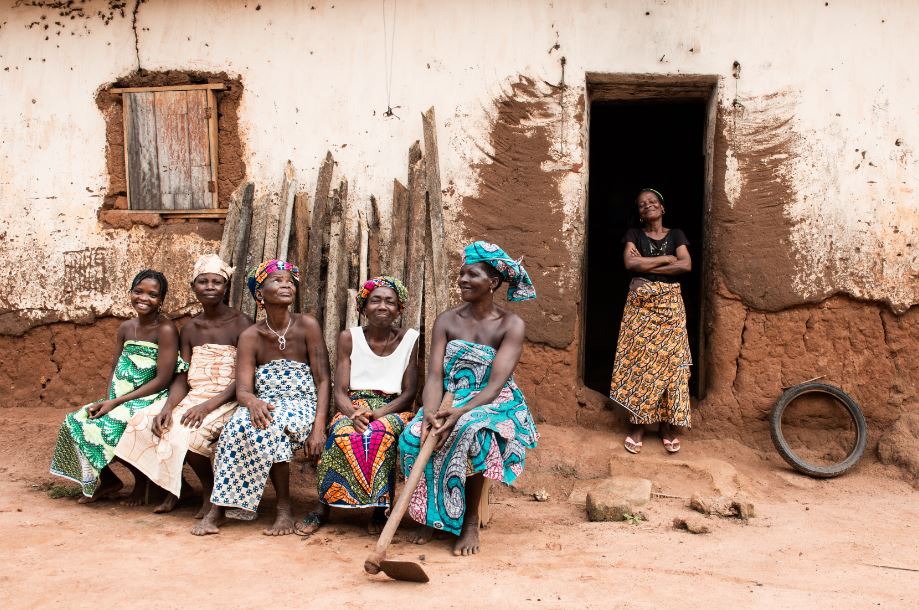I have spent the last three years bringing together the stories of over 50 farming communities around the world for a photographic exhibition called We Feed the World, which launched in London and around the world last October. As every journalist will tell you, it is always a privilege to listen to people relay their life experiences, but the stories I treasured most, and continue to stay with me six months on, are those of the women farmers.
From Burkina Faso to Nicaragua to Slovakia, I talked to incredible women who have turned their lives around and transformed the health and fortunes of their families through farming. In many cases, this was despite the obstacles put in their way by male-led governments, profit-seeking corporations and even well-meaning philanthropic endeavours who believed they knew what was best for these communities.

It is often women who lead the resistance against such “progressive” plans as GM seed, chemical fertilisers, cash crops or mining companies wanting to buy up their land. They understand that despite the attraction of quick money, the greatest legacy they could leave their children is their heritage and the knowledge passed down from one generation to the next.
In London, I had the honour of meeting Nonhle Mbuthuma, whose powerful portrait we featured and who came to speak at the two-week event that ran alongside the exhibition. Nonhle is the leader of the Amadiba Crisis Committee and has spent the last 12 years fighting off an Australian mining company who wanted to extract titanium from South Africa’s Wild Coast. She works alongside the women of her ancestral homeland to protect their rights to fish and farm, so they can provide food for their families in these remote communities. Nonhle’s position means she must live under armed guard – her predecessor was assassinated, and she faces constant death threats – but she knows that protecting the land and their agricultural way of life will give them security for many years to come.
Internationally, women produce more half of all the food that is grown. In the global south, they are responsible for 60-80 per cent of food production. In most traditions around the world, they are also the sole custodians of seed, of farming traditions and of the health and welfare of the family. They are also highly ecologically literate, able to assess what to plant by reading the complexity of the soils, the climate, the seasonal changes and the needs of the community.
One of the stories I loved most was of a women’s cooperative on the beautiful volcanic island of East Flores in Indonesia. The community of Likotuden had struggled for years with poverty and hunger after being convinced by the government to rip up the sorghum that had grown prolifically in the area and to plant commercial rice varieties instead.
Despite increasing amounts of chemical fertilisers, the rice failed year after year and the men of Likotuden were being forced to leave to find work elsewhere. In the midst of this, the women made the decision to collect the old sorghum seeds, which had been carefully stored away by the elders, and to experiment with planting them on 30 acres of rocky ground.
The crop flourished and soon it was being turned into flour, porridge, brownies, popcorn and pizzas. as well as sold at market. For the community, the women’s ‘experiment’ turned out to be a route to independence, allowing them to break free from a reliance on chemical fertilisers and pesticides as well as from a cycle of debt.
Study after study shows that when women prosper, communities prosper as they are more likely to invest in their homes and families. Despite this, they remain marginalised when it comes to owning land and leading on agricultural projects. Today, women own less than 20 per cent of agricultural land and are often forced to work for others in order to feed their children. In many countries, their access to livestock, tools and even their own wages are controlled by their husbands.

While women in the UK might not face the same level of discrimination as women in other countries, they still own just 14.9 per cent of all registered farms – despite the number of women farmers having tripled in the last ten years. Historically, their contribution to farming has been viewed more as a supportive role – ‘the farmer’s wife’ or ‘the farmer’s daughter’ who will lose out on inheriting the farm to her brother.
As we sit on the precipice of negotiating a new agricultural policy for the UK, this could be the time to recognise the crucial role women play not just in farming and food production, but in our future food security. The National Farmers Union (NFU) recently appointed a woman, Minette Batters, for the first time in its 110-year history. Let’s hope it’s a sign of things to come.













0 Comments